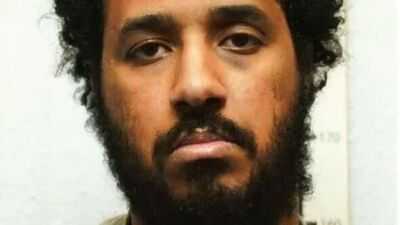
An ISIS terrorist jailed for life could receive compensation due to suffering PTSD from solitary confinement. A judge has ruled that Sahayb Abu, 31, had human rights breached when he was placed in solitary confinement and could talk to other prisoners only through his window. The Islamic State (ISIS) terrorist plotter was jailed for life in 2021 after being found guilty of planning a terrorist attack. The man had been arrested after discussing guns with an undercover police officer on Telegram. He also bought a sword, a balaclava and a combat vest.
Between July 2020 and September last year, he was held in the mainstream prison population. Later, reports of his behaviour raised concerns about him radicalising other inmates as he was "sharing his Islamist extremist ideology". Abu was moved to the "separation centre" at HMP Frankland in Co Durham - with six prisoners - to prevent him spreading his extremist beliefs, the High Court in London was told.
Abu filed a legal claim against the Ministry of Justice, challenging the conditions of his detention since April, following a serious violent attack on prison staff.
Abu claimed that he was confined to his cell for more than 22 hours a day and barred from contact with other inmates, claiming the conditions had harmed his mental health and breached his human rights.
On Tuesday, Mr Justice Sheldon ruled in his favour on three parts of the case, opening the possibility that the convicted terrorist could receive compensation.
In April, Abu was being held in a separation unit at HMP Frankland when guards were attacked by another prisoner. Manchester Arena bomber Hashem Abedi is accused of carrying out the assault and awaits trial.

Following the incident, the Ministry of Justice moved several inmates, placing Abu in a separation unit at HMP Woodhill after assessing that he posed a potential risk of a terrorist-motivated attack on staff. He remained there for three months with basic items in his cell, access to calls, and limited contact with other inmates through a window, the court heard.
From April 25, he was allowed just over an hour a day out of his cell for exercise, laundry, and showers. He later received half an hour of library access, a TV, and religious texts, and eventually weekly gym sessions and brief contact with another prisoner. He declined offers of Sudoku and colouring books.
Abu told the court he had been assaulted by guards at Frankland and said segregation left him struggling, on high alert, and unable to sleep, reporting that he heard voices during this period, reports The Times.
On July 23, he was transferred to HMP Full Sutton for continued segregation, where staff noted he had made threats to "gain revenge" on Frankland officers. In August, he sent a letter threatening self-harm.
Despite this, his segregation was repeatedly authorised on safety grounds. Abu brought a judicial review on five grounds, arguing the regime damaged his mental health and breached Article 3 of the European Convention on Human Rights.
In his ruling, Mr Justice Sheldon said prison authorities had to balance Abu's safety against wider security concerns, especially amid uncertainty following the Frankland attack.
But eventually, he ruled: "The suffering (he) has experienced goes way beyond the inevitable element of suffering that is connected with segregation: an otherwise legitimate form of treatment.
"An individual who is segregated from others and deprived of the usual activities available to prisoners (education, work, communal prayer) will inevitably suffer isolation and an element of distress and anxiety.
"What (Abu) experienced was much more severe than that: he is suffering from post-traumatic stress disorder, brought on - at least in part - by the segregation.
"The mental health support provided to the Claimant has not mitigated his symptoms of trauma and distress, and will not do so for some time, if at all, if he remains within the full strictures of the segregation regime."
Abu himself was radicalised during his time in prison for bulglary.
Under the name the "Masked Menace", the aspiring rapper wrote rap lyrics before his arrest, which included the line: "Man, I shoot up a crowd cos I'm a night stalker/ got my shank, got my guns, straight ISIS supporter." He was preparing an attack in London streets.
-
International Men's Day 2025: A Look At Its History, Significance And Theme Of This Year

-
India's current account deficit expected to rise to 1.7% of GDP in FY26 due to persistent tariff pressures: Union Bank Report

-
Taiwan's energy strain justifies shifting chip production to US, says former Intel CEO Pat Gelsinger

-
GST collections in Nov can cross Rs 2 lakh crore, Maharashtra to top: SBI Research

-
Heavy rain alert in Tamil Nadu: IMD issues multi-day warning for these districts
